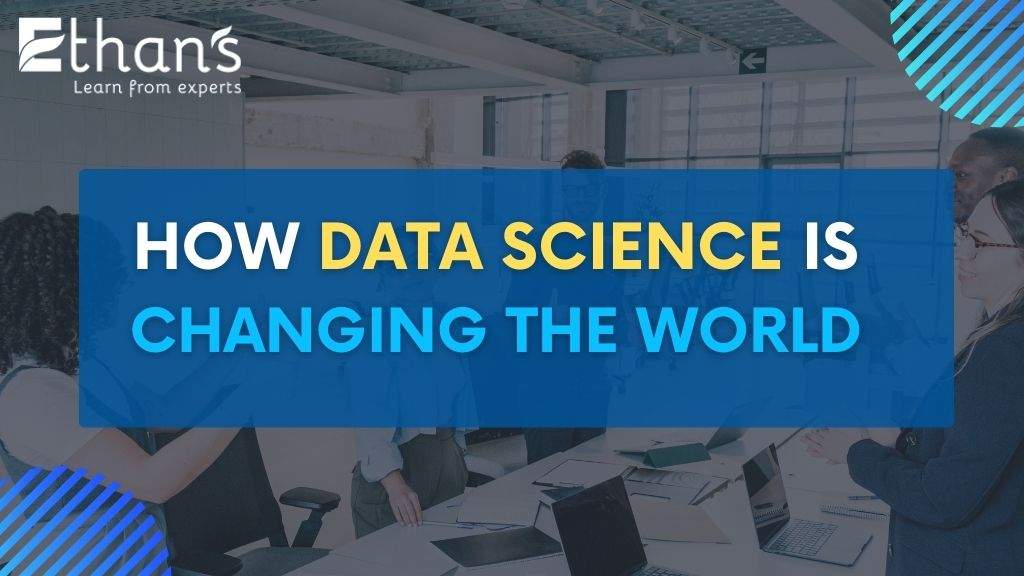In the digital age, data has become the lifeblood of numerous industries. The rise of data science, a multidisciplinary field that combines statistical analysis, machine learning, and domain expertise, has revolutionized the way businesses and governments operate. Data science is transforming the world in unprecedented ways, providing valuable insights, driving decision-making processes, and revolutionizing various sectors. In this article, we will explore the profound impact of data science on different industries, its role in shaping government policies, ethical considerations, challenges, and the exciting possibilities that lie ahead.
Impact of Data Science on Industries
-
Healthcare
Data science has ushered in a new era of personalized medicine. By analyzing vast datasets, including patient records, genetics, and medical research, data scientists can identify patterns and develop predictive models for disease diagnosis and treatment. This has led to faster and more accurate diagnoses, resulting in improved patient outcomes. Additionally, data science is transforming drug discovery and development, making it more efficient and cost-effective.
-
Finance
In the financial sector, data science has transformed risk assessment and fraud detection. Advanced algorithms analyze transaction data in real-time, enabling financial institutions to identify suspicious activities and prevent fraudulent transactions. Data-driven insights also help investors make informed decisions, optimize portfolios, and predict market trends.
-
Marketing and Advertising
Data science has revolutionized marketing and advertising by enabling targeted campaigns. Through analyzing consumer behavior and preferences, businesses can create personalized ads that resonate with their target audience. This has led to higher conversion rates, increased customer satisfaction, and more effective marketing strategies.
Data Science in Government and Public Policy
Crime Prediction and Prevention
Law enforcement agencies are leveraging data science to predict crime hotspots and deploy resources more effectively. By analyzing historical crime data and socio-economic factors, predictive models can identify areas at higher risk of criminal activity, leading to proactive crime prevention strategies.
Urban Planning
Data science plays a crucial role in urban planning by analyzing population demographics, traffic patterns, and environmental data. This helps city planners design efficient infrastructure and make data-driven decisions to create sustainable and livable urban spaces.
Disaster Management
During natural disasters, data science helps government agencies coordinate relief efforts. By analyzing real-time data such as weather patterns, social media feeds, and satellite imagery, authorities can quickly assess the situation, allocate resources, and respond effectively.
Data-Driven Decision Making
Personalized Customer Experience
Businesses leverage data science to deliver personalized customer experiences. By analyzing customer behavior and preferences, companies can recommend products and services tailored to individual needs, enhancing customer satisfaction and loyalty.
Supply Chain Optimization
Data science optimizes supply chain operations by analyzing data from various touchpoints, such as supplier performance, inventory levels, and transportation data. This enables companies to streamline processes, reduce costs, and improve overall efficiency.
Predictive Maintenance
Data science has revolutionized equipment maintenance by enabling predictive maintenance. By analyzing sensor data and equipment performance, businesses can detect potential failures before they occur, reducing downtime and maintenance costs.
Ethical Considerations in Data Science
Privacy Concerns
As data collection and analysis become more prevalent, there are growing concerns about data privacy. Data scientists must implement robust security measures to protect sensitive information and ensure compliance with data protection regulations.
Bias and Fairness
Data bias can lead to unfair and discriminatory outcomes. Data scientists must actively identify and address bias in their models to ensure fair and equitable results.
Transparency and Accountability
Data science models should be transparent, allowing stakeholders to understand how decisions are made. Ensuring accountability is crucial, especially when data-driven decisions impact individuals or communities.
Challenges and Opportunities for Data Science
Data Security
With the increasing volume of data, ensuring data security becomes paramount. Data breaches can have severe consequences, necessitating robust cybersecurity measures.
Skill Gap
The demand for data scientists surpasses the supply of skilled professionals. Bridging this skill gap is essential for organizations to fully leverage the potential of data science.
Data Visualization and Storytelling
Communicating complex data insights effectively remains a challenge. Data visualization and storytelling techniques are vital for conveying information to non-technical stakeholders.
Read Full Blog – Career Opportunities After Completing a Data Science Course in Pune
Future of Data Science
The future of data science is filled with exciting possibilities. As technology advances, data science will continue to drive innovation across industries. Breakthroughs in artificial intelligence and machine learning will unlock new insights and applications, further transforming the world.
Data science has emerged as a game-changer, revolutionizing industries, governments, and decision-making processes. Its potential to unlock valuable insights and drive innovation is unparalleled. However, with this power comes responsibility. Ethical considerations and data security must remain at the forefront of data science practices to ensure a positive and equitable impact on society.





